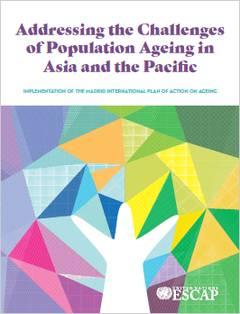
https://www.unescap.org/kp/2022/climate-change-and-population-ageing-asi...
Link to the paper: https://www.unescap.org/sites/default/d8files/knowledge-products/Climate...
The paper calls for a coherent policy approach that is inclusive and forward-looking. One that protects older persons from climate impacts, reduces their contribution to greenhouse gas emissions and harnesses their potential in climate action. It outlines several recommendations to support Asia-Pacific countries in considering the intersection between climate change and population ageing in the above-mentioned Regional Review. Importantly, it recognizes that older persons must have a voice in climate action.
Abstract
The population of the Asia-Pacific region is rapidly ageing. The number of people aged 60 years or over is projected to increase from 13.6 per cent in 2020 to 24.9 per cent in 2050. This shift in age structure is occurring while human-induced climate change is increasing the frequency and intensity of extreme weather events such as heatwaves, tropical cyclones, storms and droughts. In this context the region has experienced significant climate-related natural disasters and its population is highly vulnerable to future disasters.
The 2002 Madrid International Plan of Action on Ageing (MIPAA) is a global framework for policy action on ageing to build a society for all ages. MIPAA complements the 2030 Agenda for Sustainable Development, since older persons are most at risk from being left behind. In 2022, the Asia-Pacific Intergovernmental Meeting on the Fourth Review and Appraisal of the Madrid International Plan of Action on Ageing will take place; it will provide an opportunity for ESCAP member States and other stakeholders to consider key issues associated with growing old amidst a changing climate.
This paper assesses the latest evidence on climate change and population ageing in the Asia-Pacific region. It outlines implications climate change will have on meeting the objectives of MIPAA and the 2030 Agenda. The paper calls for a coherent policy approach that is inclusive and forward-looking.
One that protects older persons from climate impacts, reduces their contribution to greenhouse gas emissions and harnesses their potential in climate action. It outlines several recommendations to support AsiaPacific countries in considering the intersection between climate change and population ageing in the above-mentioned Regional Review. Importantly, it recognizes that older persons must have a voice in climate action










Add new comment